Home of the Brave
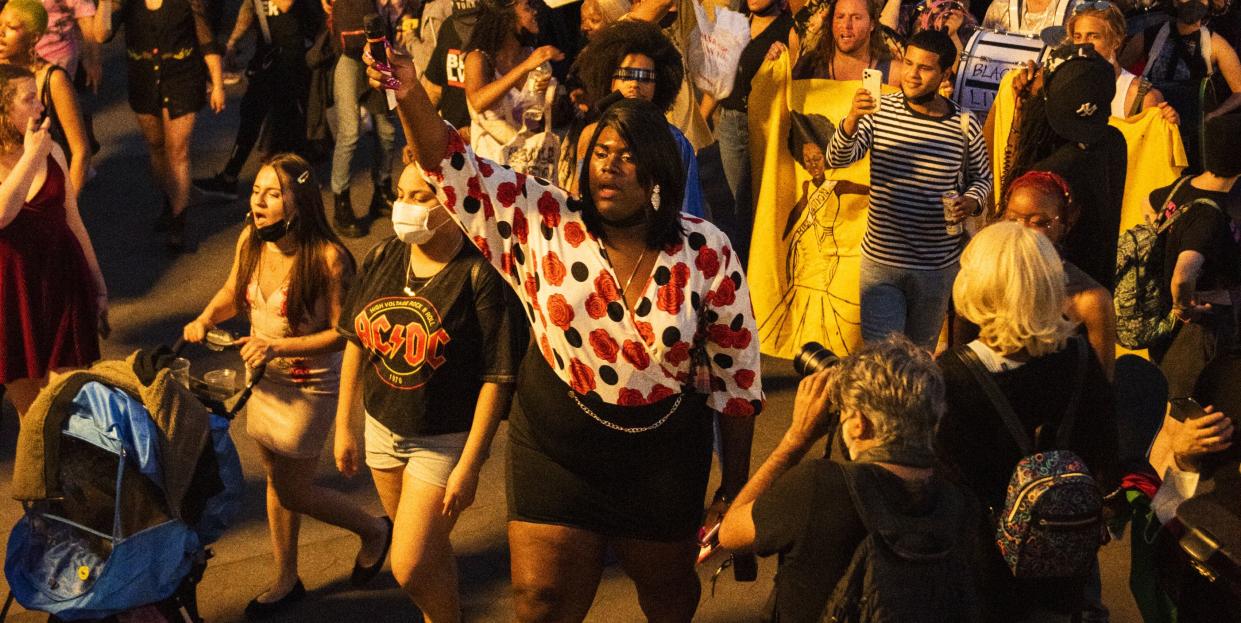
- Oops!Something went wrong.Please try again later.
- Oops!Something went wrong.Please try again later.
Beginning in June 2020, hundreds of people met every week in New York City to march for Black queer and trans lives. The weekly actions, led by Joela-Abiona Rivera and Qween Jean, became known as the Stonewall Protests and lasted for more than a year. Photographer Ryan McGinley captured this community and its glorious fight for the freedom to protest. Its members shared their stories with Harper’s Bazaar.
Joela-Abiona Rivera, cofounder of the Stonewall Protests: When Black Lives Matter gained momentum again in the summer of 2020, I was out there.
Every time I would be out there, I would bring a Pride flag with me, and there was always a problem. I got to a point where somebody actually ripped it out of my hands. Wouldn't let me be a part of the protest. I knew there were other Black trans and Black people who felt uncomfortable coming into BLM spaces—male, CisHet, female-cisgendered spaces.
I put a flyer out there for anybody who wanted to come to a protest at Stonewall Inn. It started off so small, with no more than 20 people. It grew into something amazing. We want to center Black, trans, and Black queer people.
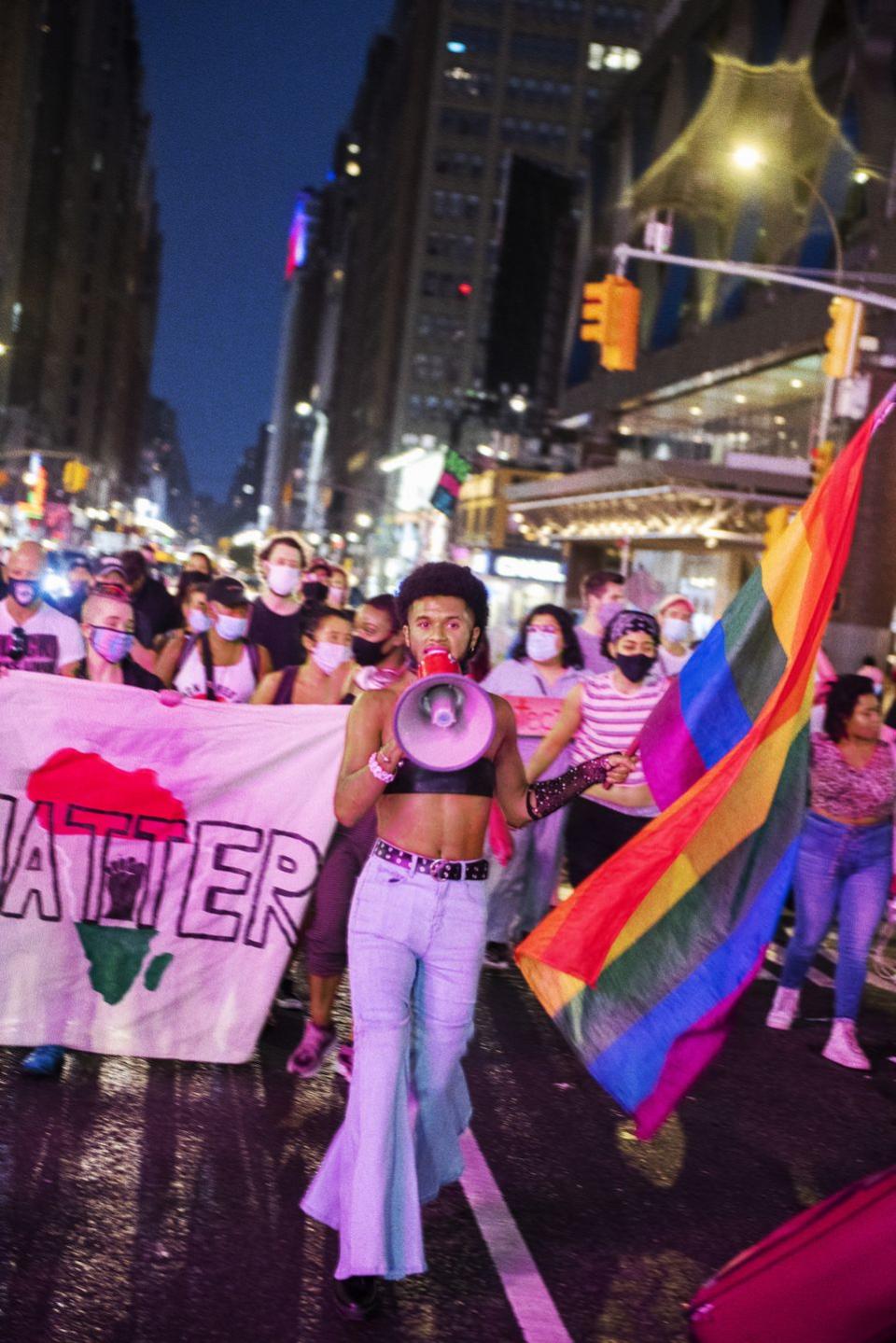
Qween Jean, cofounder of the Stonewall Protests: When we had heard about the murder of George Floyd … I watched the video of his murder and I just started crying.
Two days after George Floyd, in Tallahassee, Florida, Tony McDade, who happened to be a masculine person, was also shot and killed by the police there. And truly, there was zero mention at the time. Zero headlines. I was like, this actually is even crazier that this has happened and now no one is talking about it.
That entire year, the numbers were outrageous. On the record, there were over 55 deaths of trans and gender-nonconforming people, which means that a person was killed a week.
I was so filled with rage. It had truly boiled up in a way that I could no longer abide by the shelter in place. I was out in the streets a few years prior with Eric Garner. Mobilizing at NYU, during grad school.
So the first day of Pride, I found myself in front of the Stonewall Inn, screaming. Shouting. Demanding that people say Tony’s name. Demanding that we will not be ignored, erased, made silent even more during this revolution.
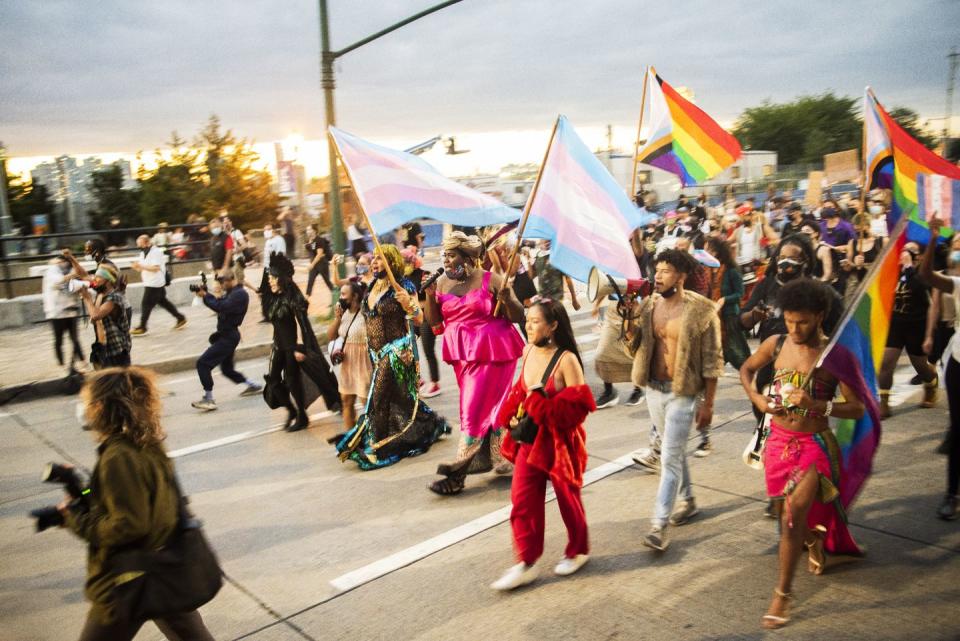
Joela-Abiona Rivera: The Stonewall protest wasn't my first street protest. It was my first one that I organized myself. I feel like I have seen other protests, especially ones in the Bronx. I never really understood it. I never really cared to know. I was also very young. When Trayvon Martin was murdered, I was nine years old.
During the Floyd protests, I started hearing people organizing through the chaos. That's what I saw, that chaos can be organized and that chaos is very influential in sustainable change.
Qween Jean: We actually have got to be so intentional in creating a safe space where folks could come, where we can honor ourselves. We can honor our ancestors. We could honor the unfortunate lives of the people that we have lost ... And It happened every week, every Thursday.
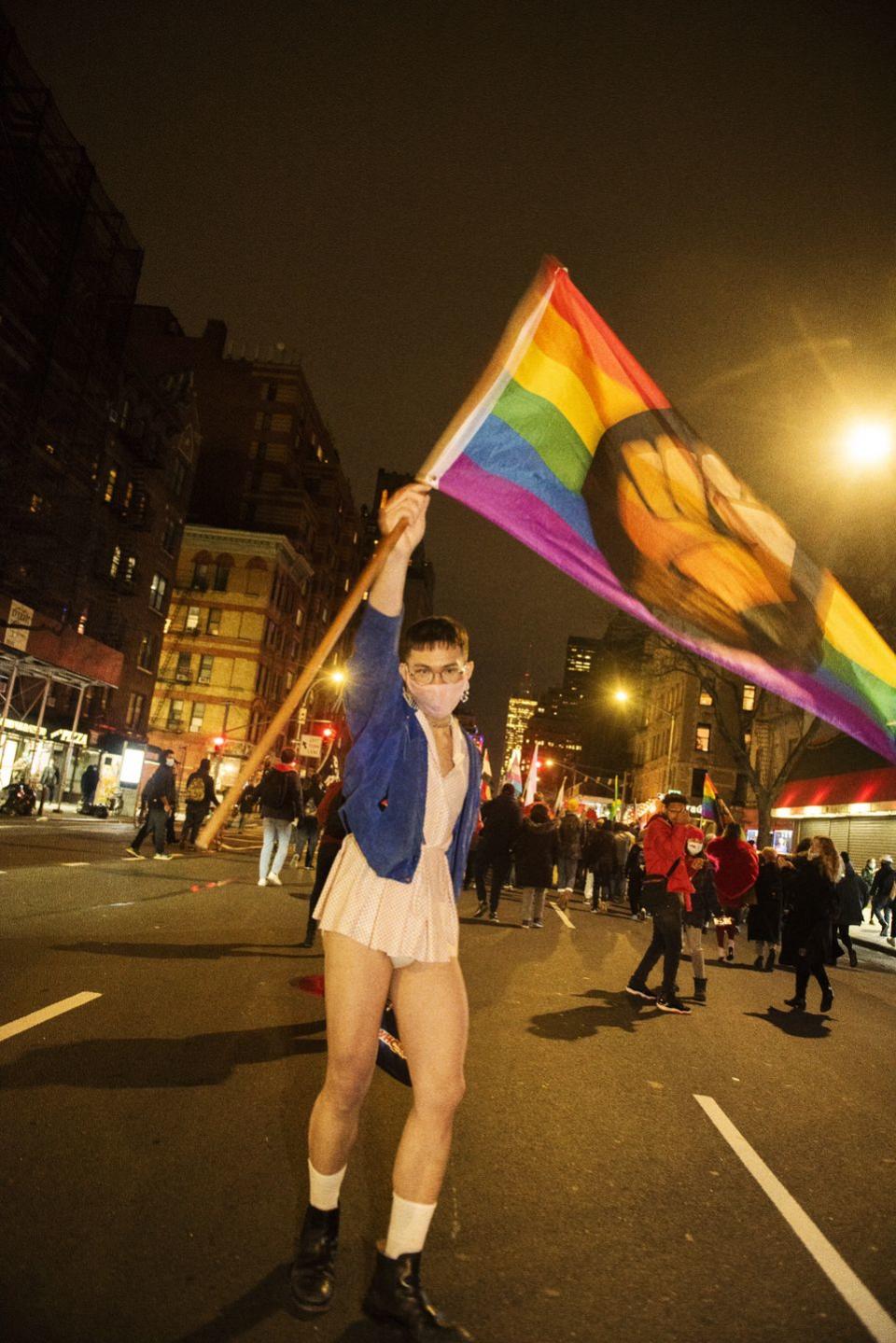
Jeerond Mussu, protester: I was taking a walk around downtown as I usually do. And then I stumbled across Joela speaking, and I stayed there and I joined the march. And I've been going there ever since.
The first time I saw a lot of beautiful faces. Just really beautiful individuals. I know when I step into that space that I feel safe. The atmosphere of that space is very elevating, and it feels like a magnet. I couldn't leave. I feel like I would like to stay in this space as long as I can.
The chanting was my favorite part of the protest, especially when Qween Jean led us through the chanting with her voice. I still can remember how she sounds. Just saying the affirmations out loud, it's great. Feels so powerful.
Zach Job, who performs as Glow Job: For the majority of the time, it felt like church. We were singing and dancing and listening to each other and letting people that needed a stage, a platform to speak, speak.
And I was getting an education. Every Thursday, I was looking forward to it. I made a lot of friends. There was a lot of love there. That's not something you saw, really, ever, unless you were there. You had to be there to feel it.
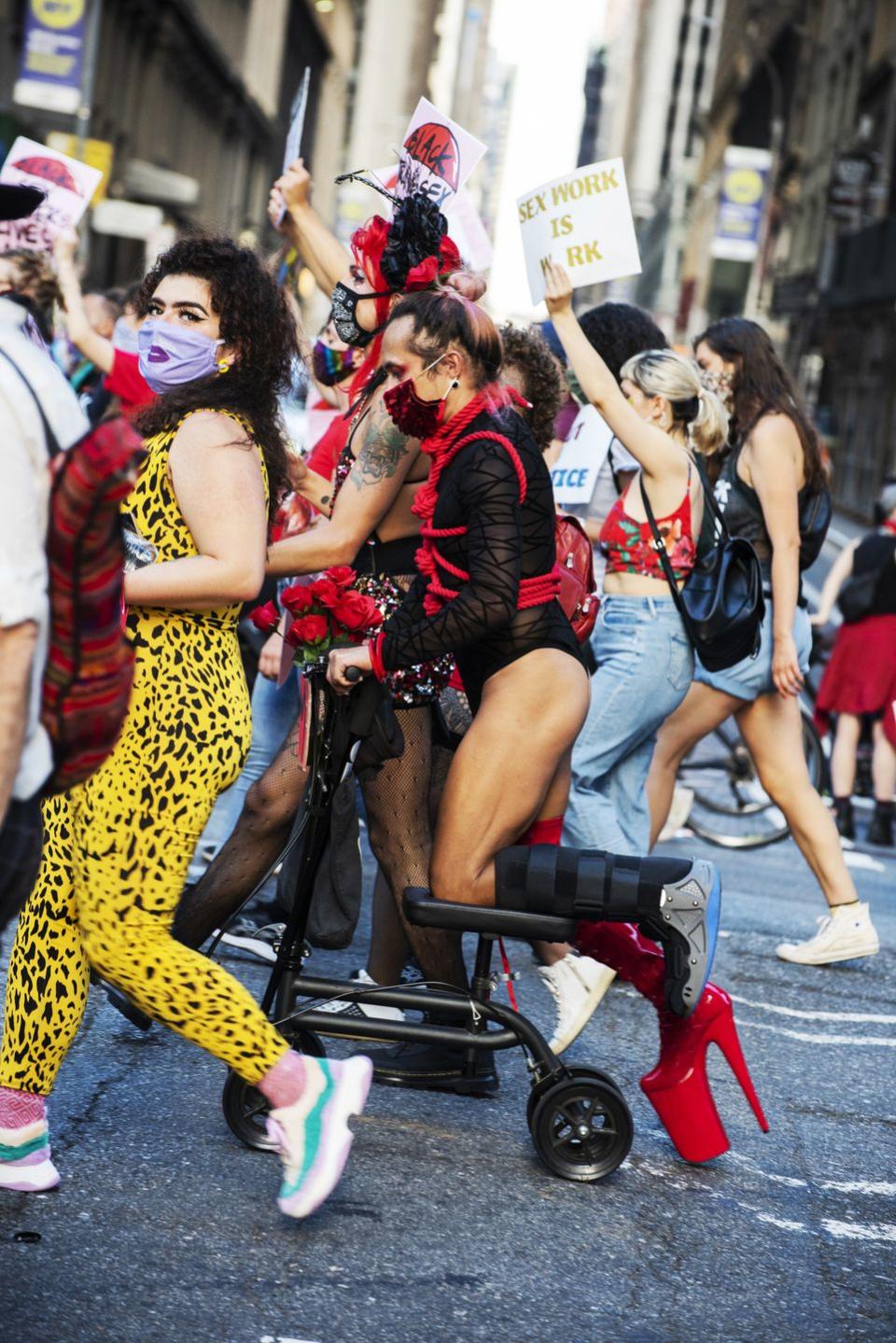
B Hawk Snipes, journalist, actor, and protester: I think, for me, I long for a sense of freedom. And at that time, I didn't see myself as a trans person. I knew I was nonbinary at that time, but I didn't know in what way I fit in the spectrum of transness, and it wasn't until I was surrounded by folks that looked like me, that sounded like me, that shared the same experience as me, the same passions, the same anger, the same sense of celebration.
Iman Le Caire, founder of Trans Asylias: I joined the first protest because I wanted to tell my story and what happened to me in New York City. I was walking, going back home, and the police stopped me and they took me. I didn't know about this law called “walking while trans.” And this is the reason I was getting arrested. Because I was just in the beginning of my transition.
I am a refugee from Egypt, and I have political asylum. I cannot have the same treatment that I had in Egypt again. Especially in New York City, in the most free city on Earth.
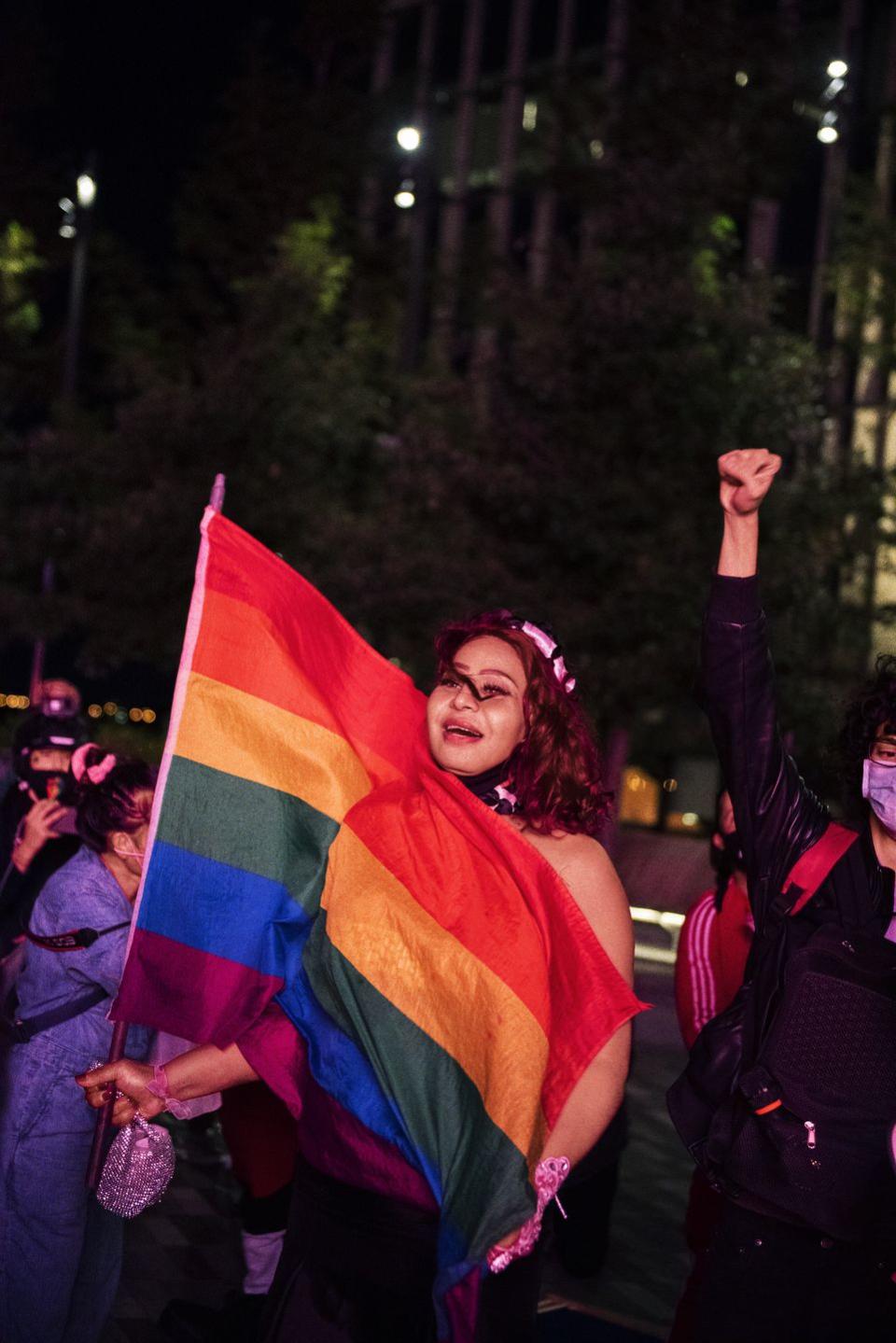
I always was outspoken. I was a host in Fire Island Pines. I was a host at Bungalow 8. I was always creating. I design my own gowns, and I use this gown for the protest. Make it more festive, encourage all the trans women and men to dress up even when we're fighting in the worst moment. It doesn’t matter, we going to survive together. Let's show beauty instead of screaming.
I created my own organization, Trans Asylias. It helps find refuge for trans people. I saved a trans woman, and now she's in France, safe. I started with that case, and I—oh my God—I could do that work and save trans people's lives.
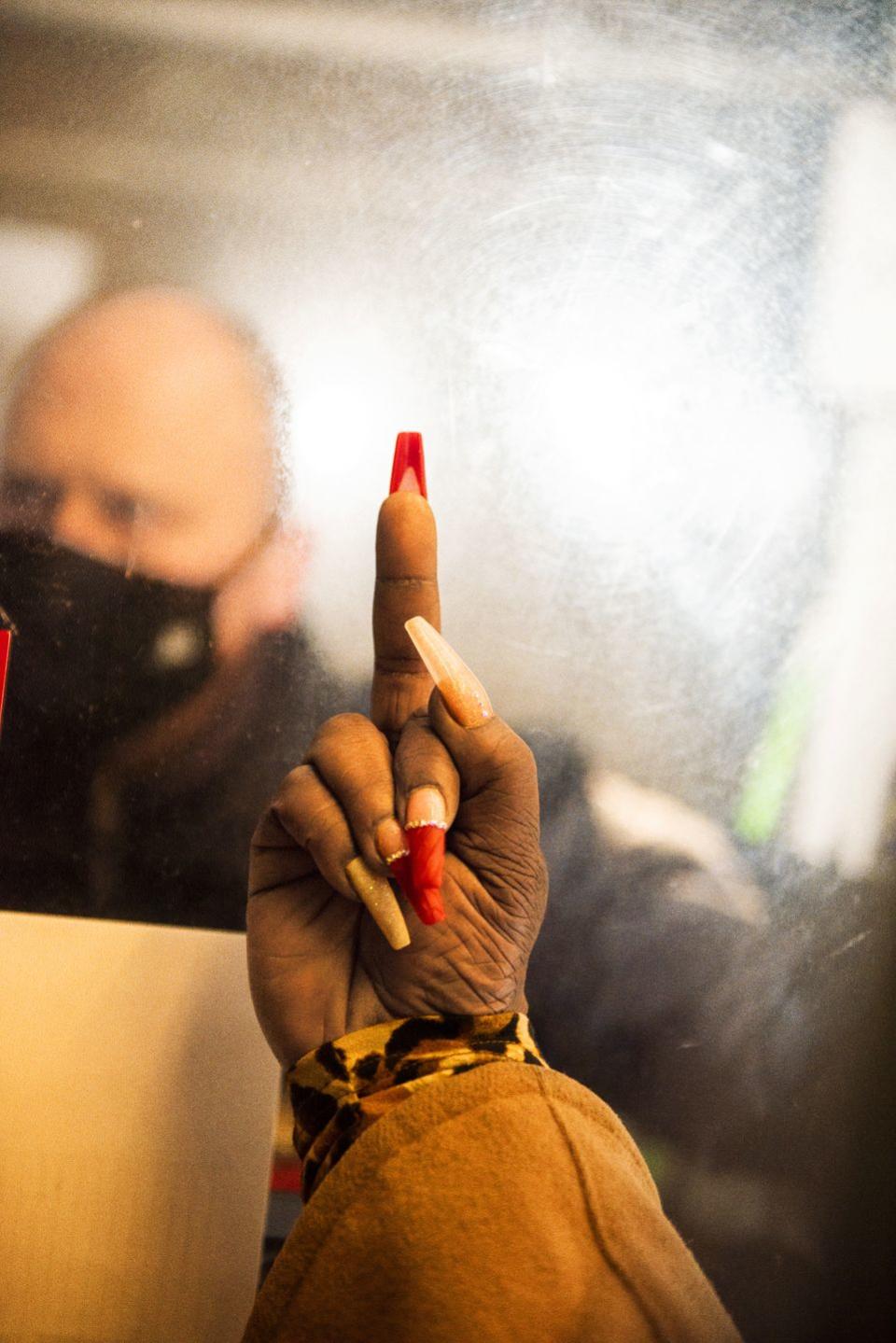
Tahtianna Fermin, founder of Bridges 4 Lyfe: I’ve been a trans activist since 2008, serving as a spokesperson for Housing Works Inc., becoming Miss Housing Works 2009, speaking at the elections for Barack Obama in Oxford, Mississippi. Speaking on trans rights and hormonal medical issues. The work I did led to the coverage of hormonal treatment by Medicaid, which didn’t exist prior to the election of Obama.
Protesting and advocating wasn’t anything new to me. What led me to this particular protest was that it centered the lives of Black trans women. And it was led by an amazing person who I didn’t know at the time. But her voice was powerful. She moved my skeleton as I stood still. I thought, “I’ve met my match!!!!!” Slightly, because we are still different in many ways, but we are definitely twin sisters. Since the day I met Qween Jean, the CEO and founder of Black Trans Liberation, I found family.
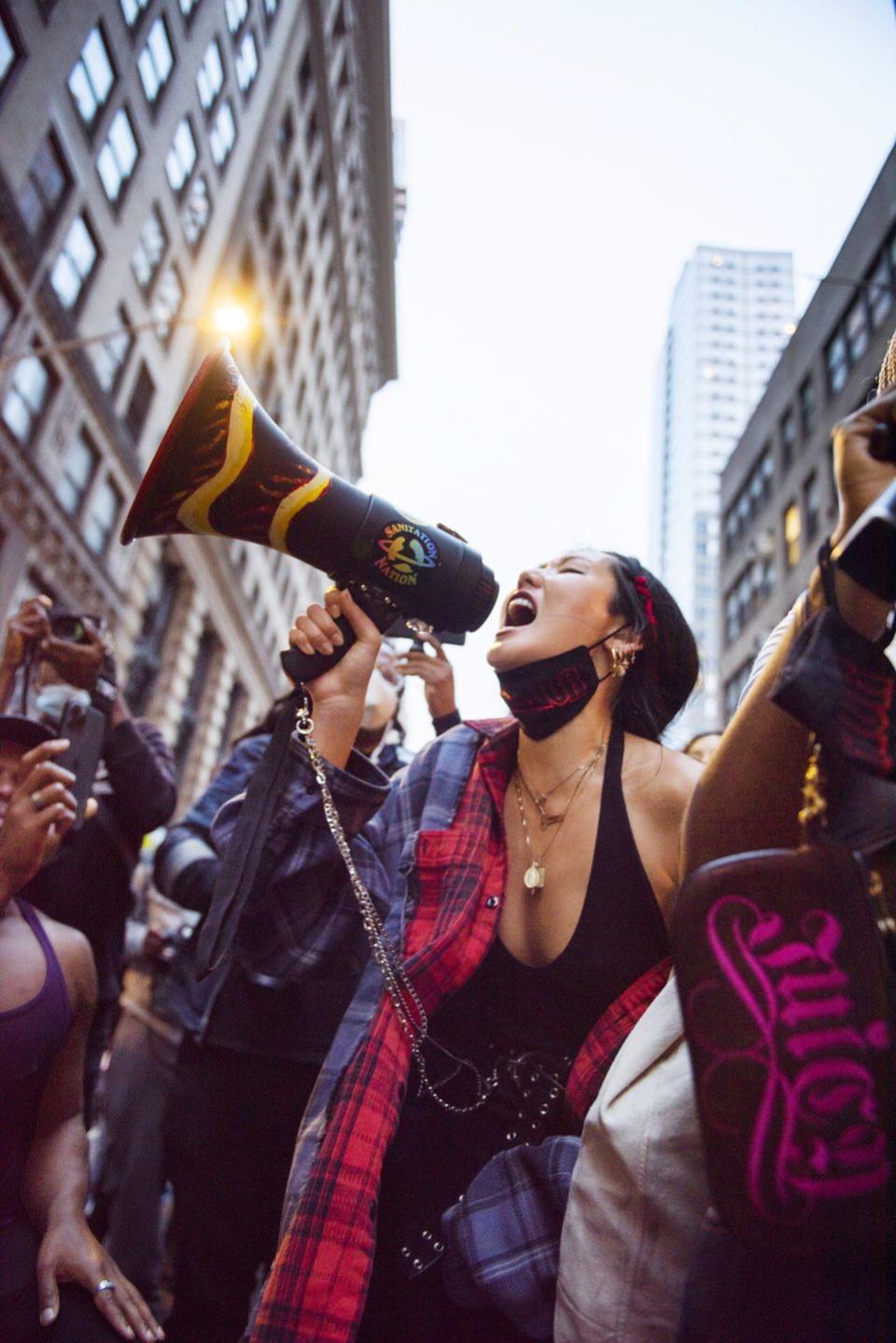
Jeannie Jay, activist, model and founder of youth organization Sanitation Nation: I threw a POC-women-in-solidarity march, in collaboration with Warriors in the Garden, in honor of all lives lost in Atlanta after the spa shootings in 2021. Stonewall protesters came and spoke and also supported.
We marched through Koreatown. That was really emotional for me because we were on the front lines in solidarity with a bunch of Black activists, with Stonewall. And to be in a space that I feel so closely connected to my heritage and my ancestors and to be chanting “Stop Asian hate” and “Black lives matter.” It was just so beautiful to bring the power of solidarity to that space. Obviously, our experiences are all uniquely lived and each community is facing its own unique form of violence. Yet I think when we can come together in solidarity, that's when we stand the strongest. The greatest gift that this work has given me is the community.
Benjamin “Benji” LeBlanc, protester: We wait so long for the fires to start burning when there are embers around, when you could have just put things out before it happens. You could help people who are struggling in the street. You can get food. You can take time to just hear somebody out.
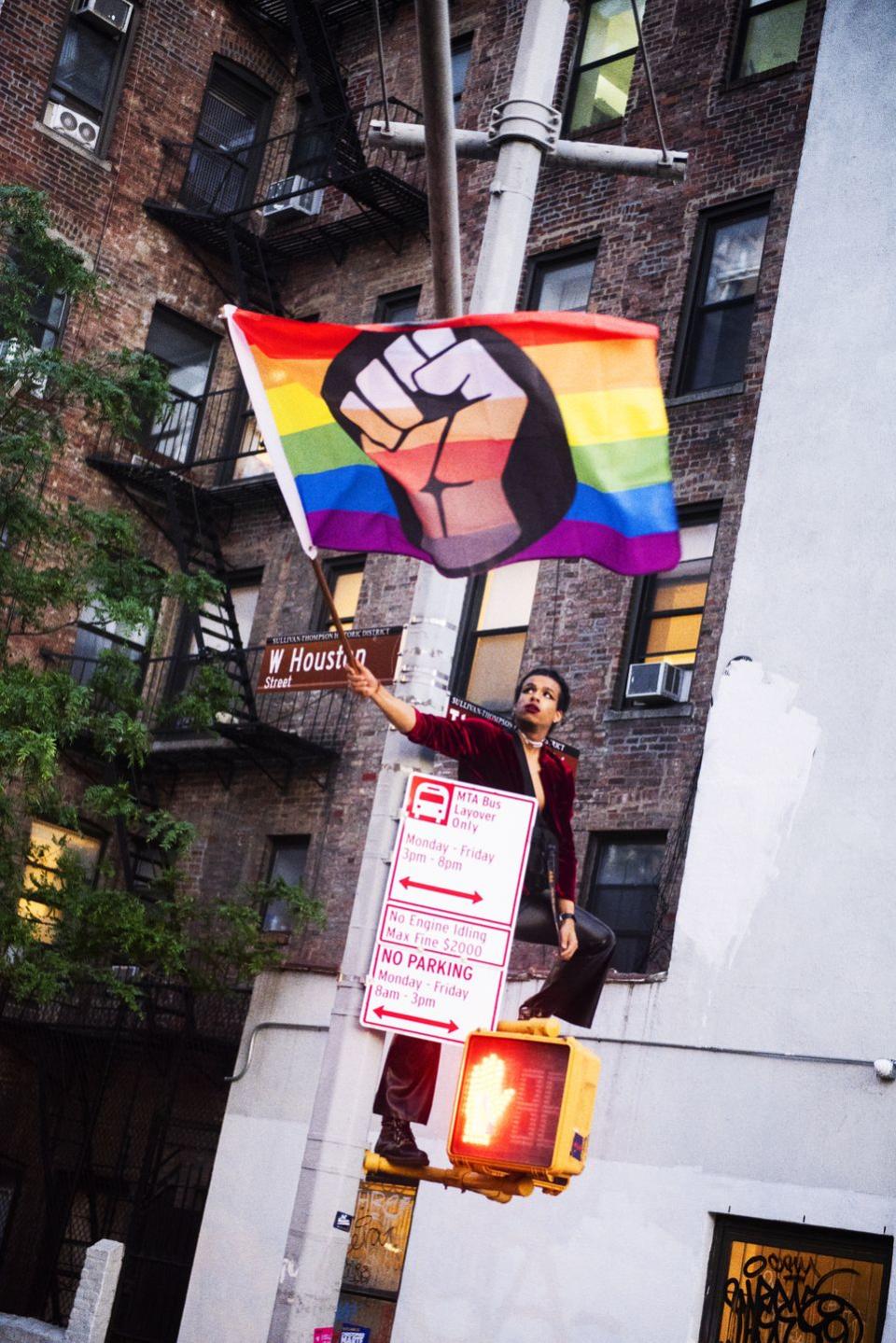
Jules Duze, protester: Another challenge was just navigating the interpersonal and decolonizing your mind. Even though you might be out protesting, you might not necessarily be doing the internal work needed to be able to help somebody address personal conflicts.
Joela-Abiona Rivera: I wouldn't say Stonewall was an abolitionist space all around. I know I was an abolitionist, but it was a space for just Black, trans, and queer people with different ideologies. And that became a problem. I would always practice abolition through anything I did. A lot of people want revenge when somebody causes harm to them, want to call the police, want to literally shun somebody, make them a pariah, kick them out of the community and throw away the key. That was something I could not do—I won't do. I think that also caused a lot of problems the majority of the time.
B Hawk Snipes: The one thing I wasn't really quite prepared for was the large groups of policing around the Stonewall protest.
As someone who is a child of a police officer, I grew up seeing a different side of things. I grew up being surrounded by traffic agents and police officers and them being kind, but knowing, at the same time, that they triggered folks.
Jules Duze: There is the constant fear of knowing that when you go to on-the-ground protests that the police brutality and the risk of being arrested very aggressively is always there. After the initial protests and marching died down, I feel like people stopped paying attention to how much the police aggressed protesters. Even now, they're still very violently attacking everyone who gathers and still fights.
B Hawk Snipes: The police said they were there to protect us, but I know at the end of the day, we protect us against them. It's like, “What are you really protecting here?”
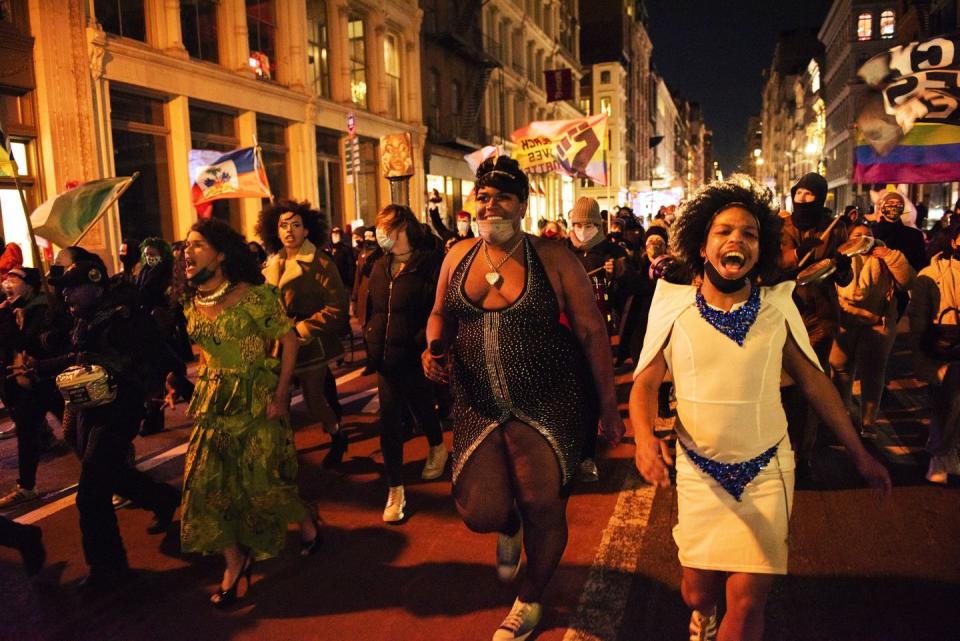
Joela-Abiona Rivera: We're not stupid, and we're not just angry. Anger plays a big part of it, but it doesn't embody our whole being. I think people think that's just how our mindset is—that we're just angry and we're just violent. We are those things, and I don't feel being called violent is necessarily a bad thing in certain situations, especially when you are saying, “By any means necessary.” But people should know that this was also a space of growth and community. We were all really taking care of each other, and it was a network that really helped us to not be so dependent on the government.
Qween Jean: Black trans lives still matter. And in this moment, more than ever, the forces and the systems are actively working to destroy and usurp our fight for liberation. That’s showing up right now, more than ever, in the form of these anti-trans bills, legislation that is growing from state to state that is showing us, yeah, folks are aware that trans exist.
But if we do not stand up in this moment and fight back, it’ll all truly have repeated itself, and in six years there'll be another person slain on the streets. And folks will be like, “I don’t know how this keeps happening.” And, my dear, we will truly have to literally turn the mirror. It is happening because you allowed it to happen. It's happening because you did nothing and you had all the power to stand for something.
Tahtianna Fermin: I see a change coming that most people aren’t ready for. I have a fire in my soul for freedom, equality, justice, and trans rights, and I’m not willing to let it burn out!!!!
Opening Image: Qween Jean (center), co-organizer of the Stonewall Protests
This article originally appeared in the June/July 2022 issue of Harper's BAZAAR, available on newsstands June 7.
GET THE LATEST ISSUE OF BAZAAR
You Might Also Like

